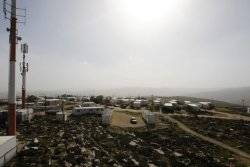Israel's Supreme Court has rejected the state's request to postpone the dismantling of a large illegal West Bank settler enclave until 2015, dealing a blow to the settler movement's hopes to keep dozens of such outposts standing.
The state submitted the delay petition earlier this month, seeking to bypass the high court's earlier order to dismantle the Migron outpost by March 31 because it was built on private Palestinian land as a symbol of settler defiance.
Prime Minister Binyamin Netanyahu's pro-settler coalition had asked the court to let Migron's 300 settlers stay put until new homes would be built for them on a nearby West Bank hilltop over the next three years.
The court ruled that accepting the request would be tantamount to flouting the rule of law.
"The obligation to fulfill the [earlier] ruling is not a matter of choice," the court said.
Attorney Michael Sfard, who represented the Palestinian landowners in court, welcomed the ruling and said he had no problem with the court's compromise agreement to extend the evacuation deadline until August 1.
"The Israeli high court upheld today the rule of law and indicated that the law applies to all," Sfard said.
"I hope that the government and the settlers will not try to pull any tricks and will not try to circumvent this important decision, and that the residents of Migron will evacuate the illegal outpost peacefully, so that the land will be returned after a decade to its legal owners, my clients."
Rival land claims
Migron's residents dispute the state's position that their outpost stands on private land.
"The residents of Migron received today the harsh court ruling, which is based on the false claim of privately held land, and whose objective is the expulsion of peace-loving people," Itai Chemo, a Migron spokesman, said.
The Palestinians claim the West Bank for their future state, along with Gaza and east Jerusalem, territories Israel captured in the 1967 war. They see all Israeli settlement as illegal encroachment on land they claim for their hoped-for state.
While Israel has given its authorization to more than 120 settlements, outposts like Migron do not have even that level of legitimacy because their construction was not officially sanctioned. Yet, the government has hooked them up to utility grids and sent soldiers to protect them.
Ghassan Khatib, a Palestinian government spokesman, said the Palestinians would reserve judgment on the ruling until they see whether the government complies.
"We will judge the matter by deeds, rather by than decisions, words or intentions," he said. "Migron is only one of too many Israeli outpost-settlements that are supposed to be evacuated. The Israeli behavior vis-a-vis this, and other outposts, is an example that illustrates Israel's intention to consolidate the occupation, rather than end it," Khatib said.
Jewish settlers began setting up outposts without government approval in the 1990s, after Israeli governments pledged they would not build new settlements.
In all, half a million Israelis live on land sought by the Palestinians for a state, including 300,000 in sanctioned settlements in the West Bank and more than 3,000 in the unauthorized outposts. The others live in east Jerusalem.
PHOTO CAPTION
A view of temporary homes is seen in the unauthorized Jewish outpost of Migron near the West Bank city of Ramallah in this February 8, 2012 file photograph.
Aljazeera


 Home
Home Discover Islam
Discover Islam Quran Recitations
Quran Recitations Lectures
Lectures
 Fatwa
Fatwa Articles
Articles Fiqh
Fiqh E-Books
E-Books Boys & Girls
Boys & Girls  Women
Women










